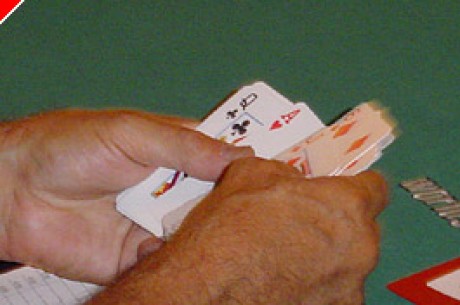Stud Poker Strategy - Lessons For My Father, Part Two

As I mentioned in part 1 of this series, I speak to my father Herb regularly about his poker play. He plays in two small stakes games each week with other retirees where he lives. They play for two hours, so it's sometimes tough to assess how well he did based on the tiny sample of hands he played. Even so, by looking at some of the details of his game I can usually find a few nuggets of information that help me guide his play.
The first observation I've made is that he plays too many hands. I found this out by asking him how many hands he usually plays - as a percentage of the hands he's dealt. He said that he plays most of them - maybe two out of three or three out of four.
Even in a loose game like the one he plays in - with many players calling nearly every bet early on, this is clearly too loose. I ask him to tell me some of the hands he's played that he thinks maybe he shouldn't play. He tells me that he often plays two suited cards - even though he knows that he probably shouldn't. He justifies it by pointing out that if he catches another suited card on Fourth Street he'll have three to a flush.
I explain that these are garbage hands and should be immediately tossed - even in loose games like his. The problem is that they lead to expensive mistakes down the road - like catching a three flush and then maybe a low pair and then playing to the River with an unplayable hand.
I also tell him to get away from other trap hands - low pairs with low kickers and one and two gapped straight hands - especially low ones. I want to talk to him about live cards and dead cards - to help him get away from three consecutive cards and three suited cards that have no promise. But I decide to save that for another lesson.
He listens politely, but I don't know how much is really sinking in. So I give him something specific and simple to do in his next few games - something that will force him to pay attention to how many hands he's playing, and in so doing focus him for closely on getting away from some of the truly awful starting hands that he's been playing.
I give him a simple assignment - just keeping track of how many hands he actually played and how many he folded on Third Street. In this way, I hope to have him remind himself throughout the night of just how important it is to fold bad starting hands.
The results on this simple assignment are, for the most part, encouraging. Even though he still plays more hands than he should be playing, I can tell that he's better able to get away from the true garbage hands. He starts out every conversation about his poker by telling me what percentage of the hands he folded. That's as good a place to start as any. And I can tell by his win/loss rate that he's actually doing better in the games.
The next lesson will be on aggression at the table - something he also needs to work on. Right now he's much too passive - so he's letting in a lot of his opponents cheaply - neither making money on them when they are drawing to their hands nor limiting the field as he should.
Ed Note: Do you want to chat in your own language at the poker table? Everest Poker's software allows you to see chat in many different languages.








